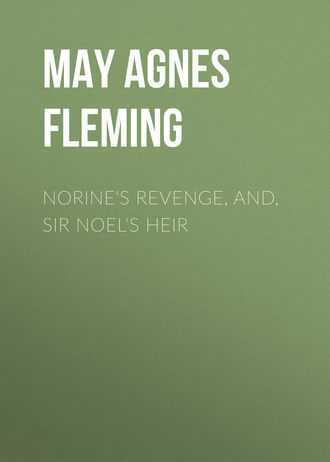
May Agnes Fleming
Norine's Revenge, and, Sir Noel's Heir
"We have had a great deal of snow lately. How are your uncles and aunts?"
But the young lady's enthusiasm was not in the least dampened. He was her friend, not her lover, he was a kindly gleam of sunshine across the dead level of her sad-colored life.
"They are all very well, thank you, Mr. Gilbert, and will be very glad to see you. Sit down and take off your overcoat. You'll stay for tea, won't you, and all night? Oh, how pleasant it is to see you back here again!"
Happy Mr. Gilbert! And yet, if he had stopped to analyze that frank, glad, sisterly welcome, he would have known it the most ominous thing on earth for his hopes. Had he been Laurence Thorndyke she would never have welcomed him like this. But just now he took the goods the gods provided, and never stopped to analyze.
"Perhaps I was mistaken after all about Thorndyke," he thought, "he has gone for good, and I never saw her look more brightly blooming. After all a girl's fancy for a handsome face, and a flirting manner, need not be very deep or lasting. It was only a fancy, and died a natural death in a week. How fortunate I spoke in time, and how clear and true she rings! I will ask her to be my wife before I leave Kent Farm."
He had come to stake his fate – "to win or lose it all," to lay his life at her feet, but he had hoped for nothing like this. He loved her – he knew it now as your staid middle-aged men do once in a lifetime. He had waited until he could wait no longer – she might refuse, he had little hope of anything else, but then at least, any certainty was better than suspense.
Mr. Gilbert's greeting from the Kent family was all that mortal man could look for. They had guessed his secret; perhaps they also guessed his object in coming now. He was very rich, and above them no doubt, but was there king or kaiser in all the world too good for their beautiful Norine.
He stayed to tea. After that meal, while Aunt Hetty was busy in the kitchen, and the men about the farm-yard, he found himself alone in the front room with Miss Bourdon. She stood looking out through the undrawn curtains at the still, white, melancholy winter night.
The first surprise and delight of the meeting past, she had grown very still. His coming had brought other memories rushing upon her as she stood here in that pretty attitude looking out at the frosty stars.
She was nerving herself to ask a question. Without turning round, and speaking very carelessly, she asked it.
"I suppose Mr. Thorndyke is in New York. Have you seen him lately?"
A jealous pang shot through the lawyer's heart. She remembered yet.
"I see him very often," he answered, promptly, and a little coldly; "I saw him the day I left. He is about to be married."
She was standing with her back to him, fluttering in a restless sort of way. As he said this she suddenly grew still.
"The match is a very old affair," Mr. Gilbert went on, resolutely; "he has been engaged nearly two years. His uncle, Mr. Darcy, wishes it very much. The young lady is an heiress, and extremely handsome. They are very much attached to one another, it is said and are to be married early in the spring."
She did not move – she did not speak. A blank uncomfortable silence followed, and once more poor Mr. Gilbert's heart contracted with a painful jealous spasm. If she would only turn round and let him see her face. Who was to understand these girls!
"What! all in the dark, Norry?" cried Uncle Reuben's cheery voice, as he came bustling in redolent of stable odors. "Come, light up, and give Mr. Gilbert a song."
She obeyed at once. The glare of the lamp fell full upon her, what change was it that he saw in her face? She was hardly paler than usual, she rarely had much color, but there was an expression about the soft-cut childish mouth, an unpleasant tightness about the lips that quite altered the whole expression of the face.
She opened the piano and sung – sung and played better than he had ever heard her before. She sang for hours, everything she knew – Mr. Thorndyke's favorites and all. She never rose until the striking of ten told her that bedtime had come.
The lawyer stayed all night; but in that pleasant guest-chamber that had lodged his rival last, he slept little. Was she in love with Thorndyke, or was she not? Impossible to judge these women – any girl in her teens can baffle the shrewdest lawyer of them all. He lay tossing about full of hope, of love, of jealousy, of doubt, his fever at its very climax.
"I'll endure this torture no longer," he resolved, sullenly. "I'll ask her to marry me to-morrow."
With Richard Gilbert to resolve was to act. Five seconds after they had met, shaken hands, and said good-morning, he proposed a sleigh ride. The day was mild and sunny, the sleighing splendid, and a sleigh ride to a New Yorker a rare and delightful luxury. Would she go? Yes, she would go, but Miss Bourdon said it spiritlessly enough. And so the sleigh was brought round, and at ten o'clock in the crisp, yellow sunshine, the pair started.
But it must have been a much duller spirit than that of Norine that could have remained dull in that dazzling sunshine, that swift rush through the still frozen air. A lovely rose-pink came into her pale cheeks, a bright light into her brown eyes, her laugh rang out, she was herself as he had first known her once more.
"How splendid winter is, after all!" she exclaimed; "look at those crystallized hemlocks – did you ever see anything so beautiful? I sometimes wonder how I can find it so dreary."
"You do find it dreary, then?"
"Oh, so dreary – so long – so humdrum – so dull!" She checked herself with one of her pretty French gestures. "It seems ungrateful to say so, but I can't help it. Life seems hardly worth the living sometimes here."
"Here! Would it be better elsewhere?"
"Yes – I think so. Change is always pleasant. One grows dull and stupid living in one dull stupid place forever. Change is what I want, novelty is delight."
"Let me offer it to you then, Norine. Come to New York with me."
"Mr. Gilbert! With you!"
"With me – as my wife, I love you, Norine."
It was said. The old formula, the commonplace words that are to tell all that is in a heart full to overflowing. He sat very pale, beyond that and a certain nervous twitching of his face there was nothing to tell that all the happiness of his life hung on her reply. For her – she just looked at him blankly, incredulous – with wide open eyes of wonder.
"Your wife! Marry you! Mr. Gilbert!"
"I love you, Norine. It seems strange you have not known it until I tell it. I am double your age, but I will do my best to make you happy. Ah, Norine, if you knew how long I have thought of this – how dearly I love you, you would surely not refuse. I am a rich man, and all I have is yours. The world you have longed to see, you shall see. Be my wife Norine, and come with me to New York."
The first shock of surprise was over. She sat very still, looking straight out before her at the dazzling expanse of sun and snow. His words awoke no answering thrill in her heart, and yet she was conscious of a sense of pleasure. Be his wife – well, why not? The prospect of a new life broke upon her – the bright, exciting, ever-new life of a great city. She thought of that, not of Richard Gilbert.
"Speak to me, Norine," he said, "for Heaven's sake don't sit silent like this – only to answer no. For good or evil, let me have my answer at once."
But still she sat mute. She had lost Laurence Thorndyke – lost – nay he had never been hers for one poor second. He belonged to that beautiful, high-bred heiress whom he was to marry in the spring. She would read it in the papers some day, and then – her own blank, empty, aimless life spread before her. She turned suddenly to the man beside her, with something of the look her face had worn last night when she had first heard of Thorndyke's marriage.
"You are very good," she answered, quite steadily. "I will be your wife if you like."
"Thank Heaven!" – he said under his breath. "Thank Heaven!"
Her heart smote her. She was giving him so little – he was giving her so much. He had always been her good, kind, faithful friend, and she had liked him so much. Yes, that was just it, she liked him so well she could never love him. But at least she would be honest.
"I – I don't care for – I mean I don't love – " she broke down, her eyes fixed on her muff. "Oh, Mr. Gilbert, I do like you, but not like that. I – I know I'm not half good enough ever to marry you."
He smiled, a smile of great content.
"You will let me be the judge of that, Norry. You are quite sure you like me?"
"Oh, yes. I always did, you know, but I never – no never thought you cared for – Oh, dear me! how odd it seems. What will Uncle Reuben say?"
Mr Gilbert smiled again.
"Uncle Reuben won't lose his senses with surprise, I fancy. Ah, Norry, Uncle Reuben's eyes are not half a quarter so bright nor so black as yours, but he has seen more than you after all."
And then all the way home he poured into her pleased listening ear the story of her future life. It sounded like a fairy tale to the country girl. A dazzling vista spread before her, a long life in "marble halls," Brussels carpets, satin upholstery, a grand piano, pictures, books, and new music without end. Silk dresses, diamond ear-rings, the theatres, the opera, a carriage, a waiting-maid – French, if possible – her favorite heroines all had French maids, Long Branch, Newport, balls, dinners – her head swam with the dazzle and delight of it all. Be his wife – of course she would be his wife – to-morrow, if it were practicable.
But she did not say this, you understand. Her face was all rosy and dimpling and smiling as they drove home; and alas for Richard Gilbert, how little he personally had to do with all that girlish rapture. He saw that well-pleased face, and, like a wise man, asked no useless questions. She was going to be his wife, everything was said in that.
CHAPTER VI.
BEFORE THE WEDDING
The sober March twilight lay low on the snowy earth when the sleigh whirled up to the door. The red firelight shone through the windows, and they could see Aunt Hetty bustling about the kitchen. Neither had spoken for a time, but now Norine turned to him, as she lightly sprang out.
"Say nothing of this to-night," she said, hurriedly; "wait until to-morrow."
She was gone before he could answer, and he drove round to the stable. Uncle Reuben was there, and Mr. Gilbert remained with him until Aunt Hetty's voice was heard calling them to supper. The lawyer was standing in the doorway, watching the solemn stars come out, a great silent gravity on his face. But oh, so happy, too – so deeply, unutterably happy.
The supper table was spread, lamp-light beamed, firelight glowed, and Aunt Hetty awaited them impatient, lest her warm milk biscuits and sugared "flap-jacks" should grow cold.
Norine stood leaning against the mantel, looking dreamily into the red fire. How pale she was, how strangely grave and thoughtful. Yet not unhappy, surely, for she glanced up in her lover's face with a quick blush and smile, and talked to him shyly throughout supper. Later still she played and sang for him the songs and pieces he liked best, played a game of euchre with him, and if she thought of Laurence Thorndyke, who had taught her the game, Richard Gilbert did not know it.
"She will learn to love me," he thought. "My pretty, dark-eyed darling! I will love her so much. I will so gratify her in everything. I will be so devoted, in all ways, that she cannot help it. Please Heaven, her life shall be a happy one with me."
Norine retired early. Her long drive had made her tired and sleepy she said; but she did not go to sleep.
Moon and stars shone crystal clear, pearly bright. She blew out her lamp, wrapped a shawl about her, and sat down by the window. Weirdly still lay everything, ivory light, ebony shadows, no sound but the rattling of the skeleton trees in the wintry night wind. No living thing was visible far or near. There was only the star-gemmed sky above, the chill, white world below. She could read her heart in the holy hush of the night, and look into the life that was dawning for her, by its solemn light. Richard Gilbert's wife! How strange and unreal that seemed. She liked him very much as she might have liked an indulgent elder brother, but love him – no! She might have deluded herself into thinking so, had Laurence Thorndyke's splendid image never dazzled her. She knew better now – the knowledge had come upon her all at once, transforming her from a child to a woman.
"If I had never met him," she thought, "I might have been a happy wife, but now! Now can I ever learn to forget him, and to give Mr. Gilbert his place?"
She covered her face with her hands, alone as she was. Alas for Richard Gilbert! congratulating himself at that very moment on having won for his very own the fairest, the sweetest, the truest of her sex.
Miss Bourdon sat mournfully musing there until long past bedtime, long past midnight. Moonlight and starlight paled presently, the prospect grew gloomy, the air bitter cold, and shivering and miserable, the girl crept away to bed. Even then she could not sleep – her nerves were all unstrung and on edge. She lay broad awake trying to imagine what her life would be like as Mr. Gilbert's wife. The fairy world of her dreams and her books would open to her. Costly dresses and jewels, a fine house in New York, her carriage and servants, summer travel and winter balls – all this he had promised her. And there in the midst of it all, once again she would meet Laurence Thorndyke. It would be part of the romance, she as the wife, he as the husband of another, and the weak silly heart fluttering under the bedclothes, gave a great bound. Then she remembered that it would be wicked to wish to see him – a sin to be happy in his presence; but do what she would, the hope of meeting him again, was at the bottom of her willingness to become the lawyer's wife.
When Norine descended to breakfast next morning, she found Mr. Gilbert standing in the open doorway, looking out at the frosty sunshine. He came forward to meet her, his face suddenly radiant.
"I have been waiting to waylay you," he said, smiling, "I want you to let me tell your uncle to-day."
"You are in a hurry," Norine answered, rather impatiently.
"Yes, my darling. Why should I not be? And I return to New York early next week. You say yes – do you not, Norine?"
She smiled, and gave him her hand. She had said "yes" to a more important proposition, he had been very good to her, why should she not please him?
"Do as you like, Mr. Gilbert. Tell my uncle if you choose."
"And if he consents, Norine – as I think he will – when shall I tell him our marriage is to take place? I want it to be soon, my dearest girl, very soon, for I don't feel as though I could live much longer without you. Come, my little wife! name an early day."
"Oh, I cannot! I don't know when. Next summer some time."
"That is indefinite," he laughed. "Allow me to be definite. Say early next May."
"No, no, no! that is too soon – greatly too soon! I couldn't be ready."
"Then, when? I won't be selfish, but you must be merciful, mademoiselle, and not keep me in suspense too long."
She laughed her old gay laugh.
"Patience, monsieur; patience stands chief among the virtues. Will June do – the last?"
"The first, Norine."
Aunt Hetty was coming through the hall. Norine darted away.
"Have it as you will! Don't you want me to help you with breakfast, auntie?"
Mr. Gilbert smilingly looked after his bright little prize, so soon to be his bright little wife, then turned to Aunt Hetty.
"Where is your brother this morning, Miss Kent? I wish to speak to him."
"In the stable, I think. Shall I go and see?"
"Not at all. I will go myself."
He walked away, humming a tune, in the happiness of his heart. Ah! shone ever winter sun so brightly before, looked ever the work-a-day world so paradisiacal as now! The earth and all thereon was transformed as with an enchanter's wand to this middle-aged legal gentleman in love.
Uncle Reuben, busy among his cattle, looked up in some surprise at sight of his early visitor.
"Don't let me interfere with your work, Kent," the lawyer said. "You can attend to your horses and listen, too. I must leave the day after to-morrow; my business has been too long neglected, and I have something of importance to tell you before I go. Something I hope – I believe, you will not be sorry to hear."
The eyes of the two men met. There was a peculiar smile on the lawyer's face, a happy light in his eyes, and Reuben Kent's countenance grew suddenly bright with intelligence.
"Is it about Norry?"
A smile and a nod answered him.
"Then I reckon I can guess. You have asked her to marry you?"
"Exactly. But how, in the name of everything wonderful have you found it out?"
Uncle Reuben's eyes twinkled shrewdly.
"I ain't a lawyer, Mr. Gilbert, but I can see as far into a milestone as any other man. Do you think I s'posed it was to see me and Joe and Hetty you came to Kent Hill so often? No, sir! I see you had a hankering after our little girl from the first."
Mr. Gilbert actually blushed. And he had guarded his precious secret so carefully, he had thought.
"Well, Mr. Kent, I trust I have your approval?"
Reuben Kent stretched out his big brown paw, and grasped the lawyer's white hand.
"I give her to you with all my heart, sir. I'd rather see her your wife than the wife of the President. I've been hoping this long time it would come to this. She's a good girl, as good as she's pretty, and I know she'll make you a good wife."
Not one word of the honor done them or her by the wealthy lawyer's offer – not one thought of it. In Reuben Kent's eyes no king or kaiser on the wide earth would have been too good for his beautiful Norine.
"And when is it to be, sir?" he asked.
"The wedding?" smiled Mr. Gilbert. "The first week of June. If I possibly can, I will run down here once or twice between this and then, but I am doubtful of its being possible. I have neglected business somewhat of late, and it has accumulated. You will tell your brother and sister, Kent?"
They walked back to the house together to breakfast. Norine saw in her uncle's face that he had been told, and blushed beautifully. How very, very near and real, it seemed to bring it, this telling Uncle Reuben.
Mr. Gilbert took her out for a walk after breakfast, and Uncle Reuben availed himself of the opportunity to inform his sister and brother. They were no more surprised than he had been, and equally pleased, but Aunt Hetty cried quietly, woman-fashion, for all that.
"We will miss her so much," she said; "the old house will seem like a tomb without her. He is a good man, a rich man, and a gentleman – I ought to rejoice for her sake, but it does seem hard at first to give her up for good."
"These things will happen, Hetty," said Uncle Reuben, philosophically, but sighing, too; "it's nater. We ought to think of nothing but the Lord's goodness in giving her such a man as Mr. Gilbert for a husband."
So it was settled. When Norine came back from her walk, Aunt Hetty kissed her, shook hands with the lawyer, and the betrothal was quietly over. There was no scene, and no tears, but the good wishes for both, were none the less heartfelt for that.
The day after to-morrow came. Mr. Gilbert went, and the preparations for the wedding began. Norine's "setting out" was to be on a scale of unprecedented magnificence. Uncle Reuben had money, and did not grudge spending it. Aunt Hetty took her into town, and a whole day was spent shopping – the big family carryall went home in the evening filled to repletion with dry goods. A seamstress and a dressmaker were engaged, both to come out on the following day, and Norine, in the pleasant bustle and hurry, actually forgot Laurence Thorndyke for eight consecutive hours.
The two seamstresses came to Kent Hill the following morning, and great and mighty were the measuring and cutting that ensued. The "keeping room," was given up to them and the bride elect, and all day long, and for many days after, their busy needles flew. Before the end of the week it was known far and wide that pretty Norry Kent, as she was called there, had made a great conquest, and was about to be married to one of the richest lawyers in New York.
Mr. Gilbert's letters came like clock-work every week, and Norine's replies went dutifully the day after. They were not much like love-letters on either side, particularly on hers, but Mr. Gilbert's were deeply and tenderly affectionate, better than all the rhapsodies ever written. His presents, too – and such presents, poured in, in a ceaseless stream. Jewelry that half turned the pretty bride's head with its dazzling splendor, laces that fairy fingers alone could have woven, pretty, costly bijouterie of all kinds.
"How good he is – how good he is!" Norine thought, in a burst of gratitude. "I ought to love him – I will love him – who could help it in time, and I will make him as happy as ever I can."
She might have kept her word; it would surely have been no impossible task to learn to love Richard Gilbert. She meant it in all sincerity – his generosity had already kindled a deeper feeling than mere gratitude in her heart. The dazzle of Laurence Thorndyke's image was slowly but surely dimming, and she could sing blithely once more as she bent over her work, or tripped about the rooms. Who could be unhappy in white silk and lustrous pearls, orange blossoms and Mechlin lace, with rich rings a-sparkle on every finger, and glittering bracelets clasping the lovely arms? The color came back to Miss Bourdon's cheek, the girlish brightness to her lovely Canadian eyes – once more her gay girl's laugh rang out – once more the tripping French ballads made melody through the old gray rooms. You see she was not quite eighteen, poor child, and so much is possible for young persons of eighteen.
The weeks flew by – busy dreams; March passed, April passed. The wedding day was drawing very near. May came, mellow with sweet spring blossoms and sunshine, and the first half was over. The first Thursday in June was to be the day of days, not quite a fortnight off now. The world had woke up for her wedding, Norine thought, snow and dreariness were gone, spring, in Eden-like freshness and bloom was with them. All day long the birds sang in the sunlight; the garden was gay with odorous grasses and blossoms. In three days more the bridegroom would be here to claim his bride, to leave no more until he bore her away by his side. Yes, it was a new Eden. Kent Hill in its spring-tide resurrection, but, as once before, the serpent was close at hand.







